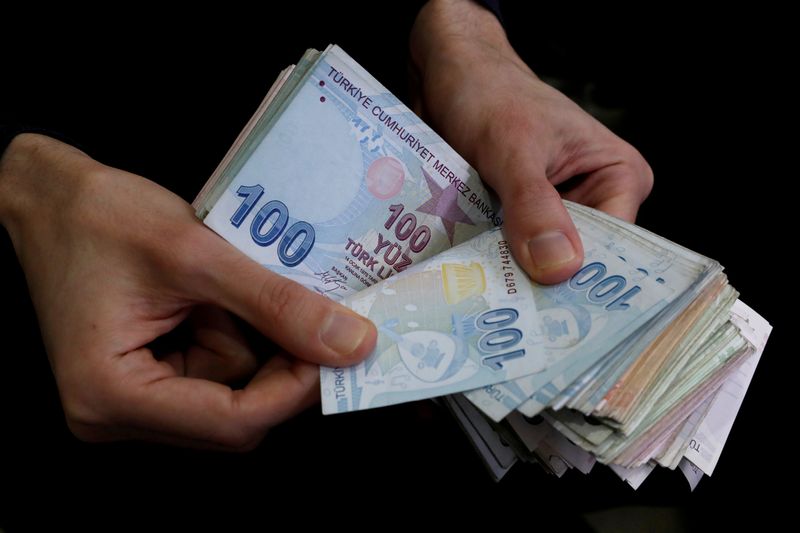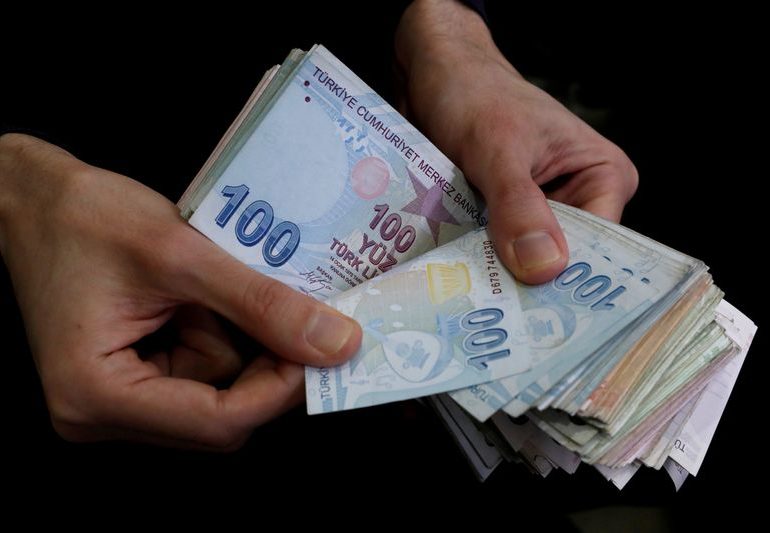 © Reuters. FILE PHOTO: A merchant counts Turkish lira banknotes at the Grand Bazaar in Istanbul, Turkey
© Reuters. FILE PHOTO: A merchant counts Turkish lira banknotes at the Grand Bazaar in Istanbul, Turkey
ISTANBUL (Reuters) – Turkey's lira slipped 1% on Monday, paring some gains after a four-month rally as rising U.S. bond yields gave the dollar a boost and as the finance minister defended his predecessor's policies that oversaw a sharp decline in FX reserves.
Data painted a mixed picture of the economy's recovery from the coronavirus pandemic with tourist arrivals still in a deep slump, and manufacturing confidence rising. Goldman Sachs (NYSE:) and Bank of America (NYSE:BAC) both upgraded GDP forecasts for 2021.
The lira – which has outperformed emerging market peers by far this year – weakened as far as 7.0275 against the dollar and was at 7.0020 at 1026 GMT, down 0.7% on the day. Last week it rallied to 6.9, the best since August.
The dollar rebounded from multi-year lows on rising expectations of faster economic growth and inflation in the world's largest economy, putting pressure on the lira.
Turkey's currency has gained more than 20% since early November when a new central bank governor and a finance minister were named, boosting expectations of tight monetary policy and a more orthodox approach after years of perceived mismanagement.
Under the former finance minister, Berat Albayrak, who is President Tayyip Erdogan's son-in-law, the central bank's FX reserves were badly depleted due to a costly policy of state banks selling some $128 billion in dollars to support the lira.
Late on Sunday new Finance Minister Lutfi Elvan condemned recent political criticism of Albayrak's policies and said transactions that had reduced reserves aimed to ensure financial stability amid the volatile pandemic.
The central bank under new Governor Naci Agbal says it will start to rebuild the reserves, which buffer against financial crisis, and which on a net basis fell by about three quarters throughout 2020.
Ratings agency Fitch revised Turkey's outlook to 'stable' from 'negative' on Friday, citing a more consistent and orthodox policy mix under a new leadership that has helped ease near-term external financing risks.
Turkey's economy, hit hard in the second quarter of last year, has rebounded well and should record growth for 2020 as a whole. BofA raised its 2021 growth forecast to 4.6% from 4.1% despite what it called signs of a slowdown in the first quarter.
Wall Street bank Goldman raised this year's expectation to 6% growth from 4%, and also pencilled in an interest rate cut to 16.5% from 17% now due to the lira's recent strength.
Turkey's capacity utilisation rate slipped a bit to 74.9% in February, still well above the decade low touched in April. Manufacturing confidence in the same period rose to 109.3 points, central bank data said.,
In January, Turkey saw less than a third of the tourists from a year earlier. Tourism revenues, key to funding the country's chronic current account deficit, plummeted last year.
Leave a comment
